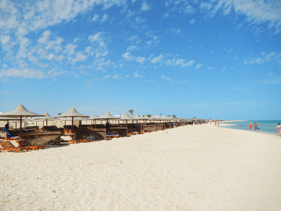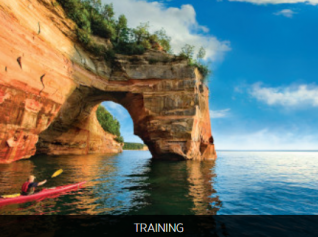Tourism taking care in a Red Sea paradise

Wadi el Gemal, Southern Egypt all-inclusivr has a good case writes Gordon Sillence
This article is a follow up to the Hurghada holiday eco-horror experience of professional sustainable tourism consultant Gordon Sillence, executive director of the DestiNet UN Partnership for Sustainable Tourism, who is pleasantly surprised to find genuine ecotourism being championed by a mass tourism resort further south …
Red Sea Ecotourism – Looking for Conservation Champions
The reputation of the Red Sea as a world class diving and snorkeling destination, alongside its extensive beach front shoreline, year-round shine and proximity to the European market has bought sun and sea tourists to Egypt in ever-increasing numbers, and even during the current crisis visitors numbers to this desert shoreline have not yet been significantly impacted by the overall collapse of tourism in Egypt. However, mass tourism has had a serious impact on the environmental basis of Red Sea tourism.
Destinations such as Sharm-el-Shiek and Hurghada, abusing their rich marine environmental assets, are displaying all the signs of rapidly and irresponsibly developed destinations in decline. As such quality tourism experiences are being sought elsewhere along the Red Sea coastline, with the mass tourism current now flowing southwards.
In fragile ecosystems with poor infrastructure development and political and economic uncertainly, mass tourism has proved a double edged sword, providing quick employment options often at the expense of the long term environment, on which the initial employment possibilities are grounded, and the sting of Read Sea beach front construction sites are a legacy of this ill-informed policy thinking.
Having left the eco-horror of Hurghada, (see previous article) my family and I travelled four hours further south beyond Marsa Alam, to stay in the Wadi el Gemal National Park, searching for a genuine winter sun and seaside ecotourism experience. Sure enough, as the coast-line desert kilometres roll by, the density of develops lessens, but it is abundantly clear that the number of both completed and unfinished hotel developments that mass tourism is already negatively impacting the southern Red Sea region.

The Gorgonial Beach Resort – a case of responsible mass tourism?
As a guest of the Gorgonia Beach Resort – itself evidence of the southward drift of mass tourism – I was invited to assess the ecotourism options and conservation strategies for the park that would avoid the environmental devastation that irresponsible mass tourism has bought to the northern fringes of the Red Sea, especially in places such as Hurghada. The Gorgonia Beach Resort is one of only two hotels actually inside the park boundaries, and its owners have expressed a strong interest in developing tourism more responsibly in partnership with the Wadi el Gemal National Park authorities, driven by both enlightened management and a strong business case to make their operations more sustainable.
The Gorgonia Beach Resort offers an excellent all inclusive 5 star sun and seaside holiday experience to up 700 guests at any one time in its spacious and beautifully designed beachfront and landscaped 350 bedroom resort site. Behind the scenes a full on management team oversee s the mission-critical operations of 370 staff, 8 diesel generators and an onsite desalination plant that keep this mass tourism show rolling in the desert sands. The question the management faces is how to make the operation sustainable, which is clearly not an option but a need, especially when you see the whole set up has taken root in precarious, resource-poor desert conditions, and, as with any mass tourism operation, the logistics are large-scale and complex.
For example, the desalination plant produces 400- 600 cubic meters of water per day to meet guest room demand, leisure facilities and kitchen operations. Up to 400 cubic meters of grey water are recycled for garden irrigation. The aim is to move from diesel generation power to solar powered energy and water production. The strategy involves replacement of current diesel generators with photovoltaic and thermal solar and replacement of diesel-based desalination with solar powered desalination plant. Currently the resort has successfully tested the introduction of thermal solar for guest room hot water requirements, and would expand the system to meet all room requirements, pool heating and kitchen operations.
As part of the strategy moving to solar power, the Resort aims to implement an increased water desalination capacity in order to be able to supply water to the national park and local communities, who in many places are currently dependent on water brought in by truck.
Alongside the conversion to solar photo voltaics and thermal solar, there are still a series of changes to be made within the resort to improve on environmental performance, such as conversion of existing high irrigation demand grassy areas to low irrigation planted areas, reduction in use of pesticides and conversion to natural pesticides, and reduction in use of plastic bottled water.
Maintaining and Developing Genuine Ecotourism

The resort is also committed to develop genuine ecotourism as part of its operations within the boundaries of the Wadi el Gemal National Park,. This makes excellent business sense, both in the short and long term it is the dive/snorkelling nature experiences which give the resort a sun-kissed underwater wonder-world USP. The strategy for this involves development of ecotourism activities such as desert rides and walks, labelling and certification, and then promotion and marketing
Specific ecotourism products include nature-based, cultural and sports ecotourism, with the following potential activities under development. A Park Partnership is necessary to develop actions including, develop specific walking and cycling trails, clean up and improve existing scenic locations, offer employment to local communities and offer environmental education to local communities via the park authorities
To avoid the mistakes of Hurghada, it will take active and enlightened business strategies that work in partnership with conservation authorities, and the Gorgonia resort is going down this path to preserve the excellent eco-tourism experiences of the Wadi el Gemal.
With the desert sands of time visibly waiting to reclaim any unsustainable tourism developments, one has to hope that efforts of the Gorgonia management will be able to hold back the desert and maintain its wonderful illusion of an oasis for eco-tourists by the Red Sea.
It cannot manage this as an isolated business, but only in partnership with other tourism and conservation stakeholders in the region. The resort has benefitted from its partnership and networking approach to sustainability. The Resort management has already looked for 3rd party independent evaluation of its sustainability efforts. It currently has Green Globe Certification, and has recently joined the Green Star Certification system evaluation process. Over time, such monitoring systems will serve to ensure business as usual will be possible for years to come.
The costly but necessary further changes outlined above would produce a showcase development for a mass tourism operation in a national park destination that would act as both a model and a benchmark for other tourism operations seeking operate more sustainably. Solar energy combined with responsible supply chain and destination management is a powerful combination for innovative and sustainable tourism development. Not only would Egypt as a whole benefit from businesses thinking like Gorgonia, but it would be a good model for other Red Sea developments and mass tourism taking root on the southern Mediterranean shoreline in similarly beautiful but threatened protected areas.
The Wadi el Gemal – A Desert Paradise
The Wadi el Gemal is one of 24 National Parks in Egypt, having obtained its protected status in 2003. It is also currently in the process of being evaluated as a UNESCO World Heritage Site.
It is a great ecotourism destination -the habitats of the 7,000 sq km park include both terrestrial and marine areas, with 120km of pristine beach front along the Red Sea, dividing the worlds’ second most important coral reef system from the striking mountainous desert landscape of southern Egypt. This fascinating park is home to several rare and endangered species, including the white eyed and sooty falcon (both unique to Wadi el Gemal), the Nubian Ibex, Dugong, and nesting sea turtles. The wadis also contain Dorkas Gazelles, ospreys and vultures, and its extensive coral reefs are visited by dolphins, whale sharks and a rich variety of fish and corals. Culturally, the park is inhabited by approximately 2000 + nomadic Bedouins, belonging predominantly to the Ababda, as well as the Beshari and Beja tribes. There are also archaeological sites containing both Roman and Egyptian ruins and mining operations.
See amazing new 2012 sustainable tourism report 93% off offer HERE
 United Kingdom
United Kingdom United States
United States Asia Pacific
Asia Pacific












































EU airports bring back 100ml liquid rule
British Airways passengers endure 11-hour 'flight to nowhere'
CLIA: Anti-cruise demos could cause itinerary changes in Europe
Co-pilot faints, easyJet flight issues ‘red alert’
Dozens fall ill in P&O Cruises ship outbreak